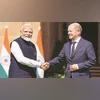Few, if any, Indian Prime Ministers have addressed football clubs. Narendra Modi will likely be the first when he speaks virtually at a summit co-hosted by Germany’s Bundesliga club VfB Stuttgart, India’s TV9 Network, and supported by the state of Baden-Württemberg.
To be held in Stuttgart at the iconic football stadium, MHP Arena, from November 21 to 23, the theme of the event is ‘India-Germany: A road map to sustainable growth’. Along with Modi, others who are expected to address the summit include sportspersons, investors, climate change activists, political leaders, and German business and industry.
The event comes on the heels of a year of intensive and high-level engagement between Germany and India, leading many to wonder if New Delhi is looking for new partners in Europe, beyond its old friend France. The locus of political power in Paris shifted dramatically after elections in September, leading to the installation of a new centre-right coalition government beset with political and financial challenges. France continues to be among India’s principal defence and security partners in Europe, but there is concern that the rights of religious and racial minorities in the country under the new dispensation could lead to a review of policies on migration and people mobility, a central issue in trade between France and India.
Ambassador Gurjit Singh, formerly India’s ambassador to Germany, says there has been forward movement in defence ties with Germany.
“Germany has not been a major partner in defence. It is now deeply interested in securing a contract for six API submarines. Spain is also vying for this significant contract. Germany has taken steps to remove logjams in the supply of small arms, which are prone to entanglements in domestic approval systems,” he told Business Standard, adding that while supplying weapons to Ukraine remains Germany’s priority, imposing limitations on its dealings with other countries is evident. The armed forces of the two countries have conducted joint exercises, such as the German Air Force’s participation in Tarang Shakti, India’s largest multilateral air exercise, for the first time in August 2024, he says.
The intensity of engagement between the two countries has deepened. The Delhi visit of German Chancellor Olaf Scholz for the seventh intergovernmental consultations (IGC) was his third in two years. PM Modi has met Scholz five times now, including his visit to Berlin in 2022 for the previous edition of the IGC.
Germany is of significant value to India as it is India’s best economic partner within the EU. Indo-German trade has now climbed to $30 billion, and mutual FDI is about $20 billion. The Asia-Pacific Conference of German Business 2024 was held in New Delhi during Scholz’s visit, with nearly 800 businesses and CEOs from Germany participating.
Singh says German industry is not looking to close down shop in China. “German industry has been the most vocal against its government’s desire to distance itself from China because German industries’ profits still largely come from China,” he explains. However, it is scouting for locations for expansion. This is borne out by the German Indian Business Outlook (GIBO) 2024 report, which came out in July, prepared jointly by KPMG (Germany) and the Indo-German Chamber of Commerce India (AHK).
Based on responses from 85 German companies operating in the country, as well as Indian subsidiaries of German companies, the report said India is a better investment destination than most Asian countries because of “consistently strong economic growth, availability of well-educated, English-speaking specialists, and low labour costs”.
However, almost two-thirds of the companies surveyed (64 per cent) cited bureaucratic hurdles, such as protectionist measures, procurement rules, and Indian standards that are not in line with international standards, as the “most negative factors for India as a place to do business”. Thirty-nine per cent of the companies surveyed said high corruption levels were the second most negative location factor. Twenty-seven per cent said India’s tax system was the third highest negative factor.
Singh says much of the onus of making India an attractive investment destination for German companies lies with India. “There is no rush of German investment to India despite talk about de-risking from China or finding a China Plus One solution. In 2023-24, German FDI in India was worth $505 million,” he says.
But trends from India point to a distinct new preference for Germany. A survey by Indian edtech company AECC for 2024 shows Indian students seeking to study abroad are rapidly changing their preference from Canada and even the US to opting in larger numbers for Germany and New Zealand. The number of Indian students enrolled in German universities has increased by 100 per cent in the past five years. In 2024, 43,000 students from India are studying in Germany, making India Germany’s largest sender market, according to government data.
In a somewhat unusual move, External Affairs Minister S Jaishankar accepted the invitation to be the chief guest at the German national day, celebrated on November 13. In the past, EAMs have rarely attended the national days of even friendly countries. In his speech, outlining all the interactions the two countries have had, he said: “2024 has been a very, very good year for India-Germany relations.” Speaking in Hindi, German Ambassador to India Philipp Ackermann said: “Mein aap sabka swagat karta hoon, main aap sabko yahan dekh kar bahut khush hoon.” As he exhorted guests to have a good time, because “Germans are well known for having good parties”, it is clear that India has a new ‘best friends forever’ in Europe – and it is Germany.
Unlock 30+ premium stories daily hand-picked by our editors, across devices on browser and app.
Pick your 5 favourite companies, get a daily email with all news updates on them.
Full access to our intuitive epaper - clip, save, share articles from any device; newspaper archives from 2006.
Preferential invites to Business Standard events.
Curated newsletters on markets, personal finance, policy & politics, start-ups, technology, and more.
)